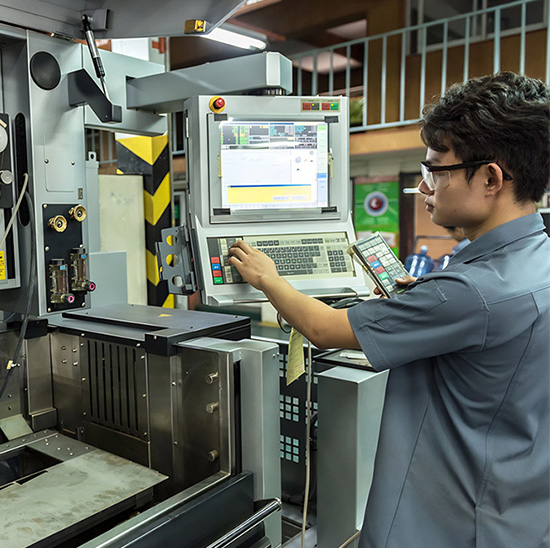エンジンの組立およびメンテナンスラインは、モーターオイルに常にさらされる最も要求の厳しい産業環境の一つです。, 潤滑剤, 冷却剤, 機械的ストレスが機器を限界まで押し上げる. このような過酷な設定に対して, 耐油性の産業用タッチディスプレイは、不可欠な制御および監視ツールとなっています, 標準のタッチディスプレイが機能しない場合でも信頼性の高いパフォーマンスを提供するように設計されています. 劣化する従来の工業用スクリーンとは異なります。, グリッチ, 油や液体にさらされるとショートする可能性があります, これらの特殊なディスプレイは、堅牢な耐油性と直感的な操作を組み合わせています。, 技術者や監督者が組立プロセスを監視できるようにする, パラメータを調整する, 中断することなくメンテナンス データを追跡します. ロボットエンジン組立セルに統合されているかどうか, 手動メンテナンスワークステーション, または品質検査ステーション, 耐油性の産業用タッチ ディスプレイは、精密制御と過酷な環境での耐久性の間のギャップを橋渡しします。これは、エンジン製造の生産性と品質を維持するために不可欠です。.
この記事では、その主要な機能について説明します, 主要なアプリケーション, 変革的なメリット, 製造リーダーや工場管理者がエンジン ライン特有の課題に耐えられるタッチ ディスプレイ ソリューションを選択できるように支援します。.

エンジンライン用耐油工業用タッチディスプレイの主な特長
1. 工業グレードの耐油性 & 液体保護
耐油性の決定的な利点 産業用タッチディスプレイ 油をはじき、液体への暴露に耐える能力です:
耐油表面コーティング: 特殊なフッ素ポリマーまたはシリコーンベースのコーティングが、モーターオイルをはじく非粘着バリアを作成します。, ギアオイル, および潤滑剤 - タッチ感度を損なう残留物の蓄積を防ぎます。.
IP67/IP68の侵入保護: ゴム製ガスケットと溶接継ぎ目で密閉されたエンクロージャがオイルをブロック, 冷却剤, 内部コンポーネントへの水の浸入を防ぎます。, 偶発的な液体の流出や高圧洗浄時でも.
耐薬品性: 工業用溶剤への耐性 (例えば。, 脱脂剤, ブレーキ液) エンジンのメンテナンスに使用, クリーニング後もディスプレイが機能し続けることを確認する.
2. エンジンラインの耐久性を高める頑丈な構造
エンジンラインには身体的酷使に耐える機器が必要です, 振動, 継続的な使用 - そしてこれらのタッチ ディスプレイは、:
耐久性の高い強化ガラス: 3mm+厚さ, 傷つきにくい, 耐衝撃性ガラスは工具の偶発的な落下にも耐えます, エンジン部品, 組立ラインでよく見られる破片.
耐振動性: IEC準拠 60068-2-6 標準, ディスプレイはエンジンの作動による振動の中でもパフォーマンスを維持します。, ロボットアーム, または近くの機械.
広い温度範囲: -20°C ~ 60°C で確実に動作 (-4°F ~ 140°F), 高温のエンジンベイとエンジンコンポーネントの低温保管エリアに適応する.
3. 正確な, 耐油性のタッチ応答性
エンジンラインの操作には、油がついた手や手袋をしていても正確な制御が必要であり、耐油性の工業用タッチディスプレイは使いやすさを優先しています。:
低遅延 (≤3ms) タッチ応答: コマンドの即時実行を保証します (例えば。, トルク設定の調整, ロボットによる組み立てステップの開始) 遅れずに, 組み立て精度を維持するために重要.
手袋をした手と油がついた手との互換性: 強化された静電容量式または赤外線タッチ技術は、オイルコーティングされた手袋でも動作します (例えば。, ニトリル, レザー) そして汚れた手, 運転前に停止して清掃する必要がなくなりました.
汚れ防止インターフェイス: 耐油性コーティングにより、指紋や油汚れでディスプレイが見えなくなるのを防ぎます。, 頻繁に掃除をしなくても視認性を確保できる.
4. 明確なプロセス監視のための視認性の高いディスプレイ
エンジンの組み立ては正確なデータの視覚化に依存しており、これらのディスプレイは妥協のない可視性を実現します。:
高輝度 (600+ ニット) パネル: 工場照明の眩しさをカット, エンジンの熱, と反射面, トルク値などのパラメータを確保する, 組み立て手順, メンテナンスのアラートが一目でわかる.
高解像度 (1080p+) 画面: 詳細なエンジンの回路図をレンダリングする, 部品図, 鮮明なリアルタイムセンサーデータ, 精密な調整と品質チェックをサポート.
色分けされたインターフェース: 大胆な色分け (例えば。, 緑色は「稼働中」を意味します,「オイル漏れが検出されました」の場合は赤) 技術者がシステムのステータスと重要なアラートを迅速に特定できるようにします.
5. エンジンラインシステムとのシームレスな統合
エンジン製造装置との互換性は非常に重要であり、耐油性の産業用タッチ ディスプレイはシームレスに統合されます。:
産業用プロトコルのサポート: PROFINETと連携, イーサネット/IP, Modbus TCP, およびCANopen, ロボットコントローラーとの通信を可能にする (例えば。, ファナック, ABB), plcs, およびエンジンテストスタンド.
ソフトウェアの互換性: 製造実行システムとの同期 (MES) およびエンタープライズ リソース プランニング (ERP) ソフトウェア (例えば。, SAP, オラクル) リアルタイムの生産追跡とデータロギング用.
柔軟な取り付け: パネルマウント, アームマウント, またはデスクトップ オプションは、コンパクトなメンテナンス ベンチから大型のロボット組立セルまで、さまざまなエンジン ラインのセットアップに適応します。.
エンジンラインにおける耐油工業用タッチディスプレイの主な用途
1. ロボットエンジン組立セル
自動エンジン組立システムにおいて (例えば。, シリンダーヘッドの取り付け, クランクシャフトフィッティング), これらのディスプレイは中央制御ハブとして機能します:
ロボットプログラミング & パラメータ調整: 技術者がトルク制限を設定する, アセンブリシーケンス, およびパーツ位置合わせパラメータを介して タッチディスプレイ, さまざまなエンジンモデル用のプリロードされたテンプレートを使用 (例えば。, 4-シリンダー, V6).
リアルタイムのプロセス監視: ロボットの位置を表示します, トルク測定値, および部品の適合データ, オイルの汚れや位置ずれが検出された場合にアラートをトリガー.
品質検証: 重要な組み立て手順のタッチ確認が必要 (例えば。, 「ピストンリングの取り付けを確認してください」) ロボットが先に進む前に, 品質基準への準拠を確保する.
2. エンジンのメンテナンス & 修理ステーション
エンジンの整備や修理に (例えば。, 販売店, 産業メンテナンス施設), 耐油性の工業用タッチ ディスプレイにより、診断とワークフローが簡素化されます:
メンテナンスマニュアルへのアクセス: 技術者がデジタル エンジンの回路図を作成する, トルク仕様, タッチディスプレイによる修理ガイドにより、油で汚れてかさばる紙のマニュアルが不要になります。.
診断データの統合: エンジン診断ツールと同期して故障コードを表示します, 油圧測定値, およびパフォーマンスデータ, 技術者をトラブルシューティングの手順に沿ってガイドする.
サービスログの追跡: メンテナンス作業を自動的に記録します (例えば。, オイル交換, 部品交換) トレーサビリティのためにそれらをエンジンのシリアル番号にリンクします.
3. エンジンテスト & 品質検査ステーション
組立後, これらのディスプレイはエンジンのテストと品質管理を最適化します。:
テストパラメータのモニタリング: エンジンテスト中にリアルタイムデータを表示 (例えば。, 油圧, 温度, 馬力) 許容範囲からの逸脱をフラグで示します.
欠陥のロギング: 技術者はタッチディスプレイを使用して欠陥を記録します (例えば。, 油漏れ, 異音) 写真やビデオをエンジンの品質記録に添付します.
コンプライアンス報告: 規制遵守のためのテストレポートを自動生成 (例えば。, EPA排出基準, ISO 9001) ディスプレイによって記録されたデータを使用する.
4. コンポーネント組立ステーション (ピストン, ガスケット, ベアリング)
手動または半自動のコンポーネント組立ステーションで, これらの表示により精度と一貫性が保証されます:
段階的な組み立てガイド: ディスプレイ上の視覚的なプロンプトにより、技術者はオイルの塗布量を確認できます。, パーツの位置合わせ, と締結シーケンス (例えば。, ガスケットの取り付け).
トルク制御監視: トルクレンチに接続し、ボルト締め付け時のトルク値をリアルタイムに表示, 締めすぎずに適切な張力を確保する.
在庫追跡: 石油の在庫レベルを自動的に更新します, ガスケット, 各組み立て後の留め具, 備品が少ないことをスタッフに警告する.
エンジンライン向け耐油工業用タッチディスプレイの利点
1. ダウンタイムの削減 & メンテナンス費用
標準のタッチ ディスプレイはオイルの損傷によりエンジン ラインで頻繁に故障し、コストのかかるダウンタイムにつながります. 耐油工業用タッチディスプレイの耐油設計と頑丈な構造により、交換率が 60 ~ 70% 削減されます。, 密閉されたエンクロージャによりメンテナンスが最小限に抑えられます (例えば。, 油で汚れた内部部品の洗浄). 彼らの長いMTBF (失敗間の平均時間) の 50,000+ 時間により、重要な生産稼働中に中断のない稼働が保証されます。.
2. 組立品質の向上 & 一貫性
正確な制御とリアルタイム監視を可能にすることで, これらのディスプレイにより、エンジンアセンブリの欠陥が減少します (例えば。, 油漏れ, トルク不足のボルト) 35 ~ 45% 増加. 一貫したパラメータの適用 - 事前にプログラムされたテンプレートと段階的なプロンプトによってサポートされ、すべてのエンジンが品質基準を満たしていることを保証します, 手戻りや保証請求の削減.
3. 技術者の安全性の強化 & 効率
エンジン ラインはリスクの高い環境です。産業用タッチ ディスプレイはリスクを軽減し、生産性を向上します。:
耐油設計により、ディスプレイコンポーネントへの油の浸入による電気的危険を排除します。, 火災や感電のリスクを軽減する.
手袋をした手と油がついた手に互換性があるため、技術者は手や手袋を洗う代わりに作業に集中できます。, タスク時間を 25 ~ 30% 削減.
直感的なインターフェイスにより、新人技術者のトレーニング時間が短縮されます。 40%, シフト全体で一貫したパフォーマンスを確保する.
4. 合理化されたデータ追跡 & コンプライアンス
エンジン メーカーは厳しい規制要件と品質要件に直面していますが、これらのディスプレイによりコンプライアンスが簡素化されます。:
アセンブリパラメータのリアルタイムデータロギング, テスト結果, メンテナンス作業により、ISO の包括的な監査証跡が作成されます。 9001, IATF 16949, およびその他の規格.
MES/ERP システムとの統合により、手動でのデータ入力が不要になります, エラーを削減し、監査中の管理作業の時間を節約します.
エンジンライン用耐油工業用タッチディスプレイに関するよくある質問
Q1: 耐油性はどの程度効果的ですか?モーターオイルや潤滑剤はタッチ感度に影響しますか??
A1: 特殊なフッ素樹脂コーティングがモーターオイルをはじきます。, ギアオイル, および潤滑剤, 残留物によるタッチ反応の低下を防止. 重油にさらされても, タッチ感度が一定に保たれるため、頻繁に掃除する必要がありません.
Q2: これらのディスプレイは工業用脱脂剤による高圧洗浄に耐えられますか??
A2: はい - IP67/IP68 定格モデルは高圧洗浄用に設計されています (まで 80 バー) 工業用脱脂剤を使用した場合, 溶剤, そして水. 密閉された筐体と耐薬品性コーティングにより、日常的なライン洗浄時の損傷を防ぎます。.
Q3: 当社の既存のエンジン組立ロボットやMESソフトウェアとの互換性はありますか??
A3: 絶対に. すべての主要な産業用プロトコルをサポートします (プロフィネット, イーサネット/IP) 主要なロボットブランドと統合 (ファナック, ABB, 泣く) およびMES/ERPプラットフォーム (SAP, オラクル, シーメンス). 私たちのチームがお客様の特定のセットアップとの互換性を検証します.
Q4: これらのディスプレイの一般的な寿命はどれくらいですか? 24/7 エンジン組立環境?
A4: 工業グレードのコンポーネントと耐油設計を採用, 継続的に7〜10年持続します 24/7 手術. ほとんどのモデルには、油への暴露に関連する欠陥や性能上の問題をカバーする 3 ~ 5 年の保証が含まれています.
Q5: ディスプレイインターフェイスはさまざまなエンジンモデルに合わせてカスタマイズできますか (例えば。, ディーゼル vs. ガソリン)?
A5: はい - インターフェースは完全にカスタマイズ可能です. モデル固有のダッシュボードを事前構成します, 組み立てガイド, およびパラメータのしきい値 (例えば。, ディーゼルエンジンのトルク設定と比較. ガソリン) 生産ニーズに合わせて. 頻繁なタスクのワンタッチショートカットも利用可能.
結論
耐油性の産業用タッチ ディスプレイは、エンジン ライン向けの究極の制御ソリューションです, 堅牢な耐油性を兼ね備える, 頑丈な耐久性, エンジンの製造とメンテナンス特有の課題を克服する直観的な操作. 一貫したパフォーマンスを提供することで、, 品質の向上, ダウンタイムの削減, これらのディスプレイは、小規模な修理工場から大規模な自動車組立工場に至るまで、エンジン ラインの管理方法を変革します。. 効率の向上を目指す製造リーダー向け, コストを削減する, エンジン製造におけるコンプライアンスの確保, 耐油性産業用タッチ ディスプレイへの投資は、長期的な価値をもたらす戦略的決定です.
エンジンラインに耐油性を装備する準備ができています, 高性能タッチディスプレイ? 当社のウェブサイト上のフォームに記入して、当社の産業技術専門家とつながりましょう. お客様の特定のエンジンラインのセットアップを評価します, 製品の耐久性と互換性を実証する, カスタマイズされたソリューション提案を提供し、効率の向上を支援します, 品質, エンジン製造作業における安全性と安全性.

